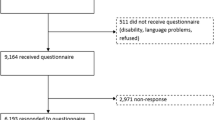Abstract
Our objective was to assess the validity of the SF-36 General Health Survey against the Social Maladjustment Schedule (SMS) and two questionnaire measures, the Social Problem Questionnaire and the Nottingham Health Profile (NHP) in a random subsample of 206 men and women from the Whitehall II study, a longitudinal survey of health and disease amongst 10,308 London-based civil servants. We found that social functioning on the SF-36 correlated significantly with social contacts, total satisfaction and total management scores on the SMS, and social isolation and emotional reactions on the NHP. General mental health on the SF-36 was associated with marriage, social contacts, leisure scores, total satisfaction and total management scores on the SMS, and emotional reactions, energy level and social isolation on the NHP. Conversely, physical functioning and physical role limitations were generally not associated with the SMS but were associated with physical abilities and pain on the NHP. In conclusion, this study offers evidence of the discriminant validity of the general mental health and physical functioning scales of the SF-36. We also found moderate construct and criterion validity for the social functioning scale of the SF-36 and considerable overlap between the general mental health and social functioning scales.
Similar content being viewed by others
References
Bergner M, Bobbitt RA, Kressell S, Pollard WE, Gibson BS, Morris JR. The Sickness Impact Profile: conceptual formulation and methodology for the development of a health status measure. Int J Health Serv 1978; 6: 393-414.
Veit CT, Ware JE Jr. The structure of psychological distress and well-being in general populations. J Consult Clin Psychol 1983; 51: 730-742.
Kaplan RM, Bush JW, Berry CC. Health status: types of validity and the Index of Well-Being. Health Serv Res 1976; 11: 478-507.
Hunt SM, McKenna SP, McEwen J, Backett EM, Williams J, Papp E. A quantitative approach to perceived health status: a validation study. J Epidemiol Comm Health 1980; 34: 281-286.
Stewart AL, Hays RD, Ware JE. The MOS short-form general health survey: reliability and validity in a patient population. Medical Care 1988; 26: 724-735.
Ware JE, Sherbourne CD. The MOS 36-item short-form health survey (SF-36): conceptual framework and item selection. Medical Care 1992; 30: 473-483.
Stewart AL, Greenfield S, Hays RD. Functional status and well-being of patients with chronic conditions: results from the Medical Outcomes Study. JAMA 1989; 262: 907-913.
Wells KB, Stewart A, Hays RD, et al.The functioning and well-being of depressed patients: results from the Medical Outcomes Study. JAMA 1989; 262: 914-919.
McHorney CA, Ware JE, Raczek AE. The MOS 36-Item Short-Form Health Survey (SF-36): ll. Psychometric and clinical tests of validity in measuring physical and mental health constructs. Medical Care 1993; 31: 247-263.
Brazier JE, Harper R, Jones NMB, et al. Validating the SF-36 health survey questionnaire: new outcome measure for primary care. BMJ 1992; 305: 160-164.
Jenkinson C, Coulter A, Wright L. Short form 36 (SF-36) health survey questionnaire: normative data for adults of working age. BMJ 1993; 306: 1437-1440.
Clare AW, Cairns VE. Design, development and use of a standardized interview to assess social maladjustment and dysfunction in community studies. PsycholMed 1978
Corney RH, Clare AW. The construction, development and testing of a self-report questionnaire to identify social problems. Psychol Med 1985; 15: 637-649.
Marmot MG, Davey Smith G, Stansfeld SA, et al. Health inequalities among British civil servants: the Whitehall II Study. Lancet 1991; 337: 1387-1393.
Weinberger M, Samsa GP, Hanlon JT, et al. An evaluation of a brief health status measure in elderly veterans. J Am Geria Soc 1991; 39: 691-694.
Brugha T, Conroy R, Walsh N, et al. Social networks, attachments and support in minor affective disorders: a replication. Br J Psychtr 1982; 141: 249-255.
Casey PR, Tyrer PJ, Platt S. The relationship between social functioning and psychiatric symptomatology in primary care. Social Psychiatry 1985; 20: 5-9.
Kessler RC, McLeod JD. Social support and mental health in community samples. In: Cohen S, Syme SL, eds. Social Support and Health. New York, NY: Academic Press, 1985: 219-240.
Roberts R, Hemingway H, Marmot M. Psychometric and clinical validity of the SF-36 General Health Survey. (Submitted).
Author information
Authors and Affiliations
Rights and permissions
About this article
Cite this article
Stansfeld, S.A., Roberts, R. & Foot, S.P. Assessing the validity of the SF-36 General Health Survey. Qual Life Res 6, 217–224 (1997). https://doi.org/10.1023/A:1026406620756
Published:
Issue Date:
DOI: https://doi.org/10.1023/A:1026406620756



